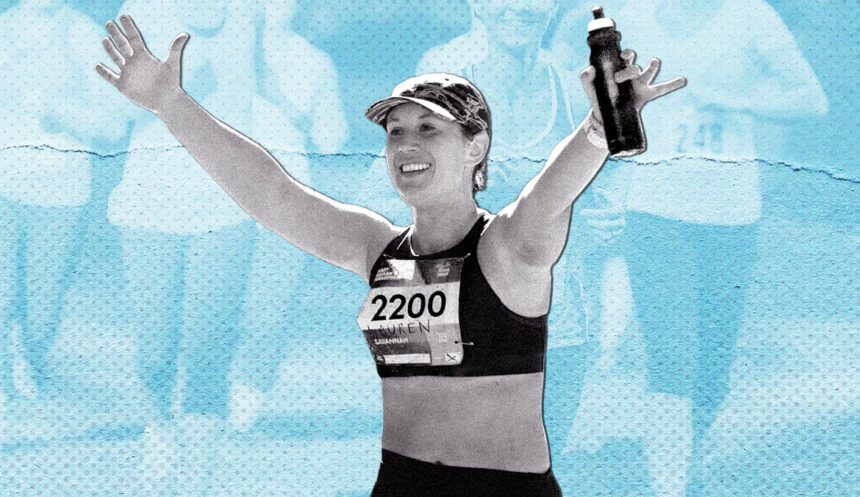In every other race, that most likely would have been the case. However that day, one other girl grabbed the bottle, and accelerated forward to reunite it with its proprietor. In return, the water bottle proprietor gifted the great samaritan one of many many friendship bracelets on her wrist, which then set off a flurry of friendship bracelet buying and selling amongst our pack of runners that lasted at the very least a mile.
That was the spirit of the Each Lady’s Marathon, a race designed for girls and placed on by Gonna Want Milk (or MilkPEP, the dairy trade group behind the well-known “Bought Milk?” marketing campaign of the ’90s). Over the course of the weekend—which included panels with the race’s esteemed captains, cooking demonstrations, yoga and mobility courses, and a post-race competition headlined by Natasha Bedingfield—I misplaced rely of the variety of occasions I assumed, “This could by no means occur at one other race.”
A few of that was most likely only a product of the truth that the members had been over 90 p.c girls. Alysha Flynn, the official run coach of the Each Lady’s Marathon, stated it was the best-smelling race she’d ever run. And Alison Mariella Désir, one of many race’s captains and the writer of Operating Whereas Black, says that the water stations had been the cleanest she’d ever seen. “This one volunteer stated, ‘You’re the nicest members I’ve ever had!’” Désir stated. “Folks had been ingesting their water and putting the cup within the trash can. I’ve by no means skilled that in my life.”
The distinction between the Each Lady’s Marathon and your typical race felt significantly stark to me having simply run the New York Metropolis Marathon two weeks prior. Whereas I really like that race, the atmosphere can really feel cutthroat, and this yr particularly, I observed simply how usually I used to be elbowed, bumped, and clipped—all the time by males, who by no means acknowledged me. Nothing of the kind occurred to me throughout the Each Lady’s Marathon. As Désir put it throughout a panel, “girls don’t simply care about our personal lived expertise—for higher or for worse, we care in regards to the lived expertise of the folks round us.”
However there was additionally lots in regards to the race that was by intentional design. “I’m going to lots of races, and significantly as a first-timer, you enter the area and you’ll really feel overwhelmed, misplaced, insignificant,” Désir stated. “This race did the whole lot to be sure to knew that you simply being there was necessary. We had been all a part of this actually particular second; everybody may really feel the enormity of it.”
On the expo, as an illustration, there was a colourful wall that includes a magnetic title tag for every runner, the colour of which corresponded to the variety of marathons they’d run. The easy act of carrying title tags in any respect opened the door for dialog all through the expo’s occasions.
“This race did the whole lot to be sure to knew that you simply being there was necessary.” —Alison Mariella Désir, runner, activist, and writer
The colour-coding was significantly conducive to creating connections: First-timers may see they had been in good firm within the sea of pink tags (40 p.c of the race’s members had been operating their first marathon). These on their second marathon (orange tag) may ask those that’d run between 11 and 30 (yellow tag) for recommendation, and all of us may marvel on the girls carrying the rainbow tags, which meant they’d run over 60. It felt like we every had permission to proudly personal our race, whether or not it was our first marathon or hundredth, and whether or not we’d end in three hours or seven.
For Flynn, even the race’s colour scheme itself was vital. “It was so daring, it was so vivid—you couldn’t have a look at it and never really feel empowered by it,” she stated. “Once I was staring on the wall of everybody’s names, after I acquired near it, I may see all of the completely different colours. However if you stood again, all of it grew to become one. To me, that felt actually symbolic, like a visible illustration of our power as girls and our power after we come collectively as a group. I used to be like, that boldness is us.”
Désir and the opposite captains—2018 Boston Marathon champion Des Linden; Olympic bronze medalist Deena Kastor; Kathrine Switzer, the primary girl to formally run the Boston Marathon; and Danielle McLaughlin, a two-time most cancers survivor, amputee and champion paratriathlete—additionally contributed to the sense that every runner mattered, handing out medals on the end line, posing for all of the selfies that had been requested of them, and proudly sporting the armfuls of friendship bracelets they had been gifted.
And since we had alternatives to make these actual connections earlier than the race, by the point we had been toeing the beginning line on Saturday morning, we actually did really feel like a group. Deliberately or not, the course itself intensified that feeling, with plenty of out-and-back sections that grew to become high-five zones. “I don’t assume that may have occurred had we not all been speaking earlier than we even acquired to the beginning line,” Flynn says. “I’ve run the Philadelphia Marathon many occasions, and there’s an enormous out and again part, and there are not any high-fives exchanged.”
The Each Lady’s Marathon has already introduced it’s going to be returning subsequent yr. This yr’s race set a brand new customary for what all races ought to be doing to incorporate each girls particularly and new marathoners normally: lactation stations, well-stocked and plentiful porta potties, and a beneficiant course time restrict.
The success of this yr’s race additionally proves that areas like these are each needed and wanted. “It’s necessary that now we have areas the place we are able to really feel necessary, the place we are able to really feel valued, the place we are able to present up as our genuine selves,” Désir stated. “I actually hope that is solely the start of extra areas like this.”












